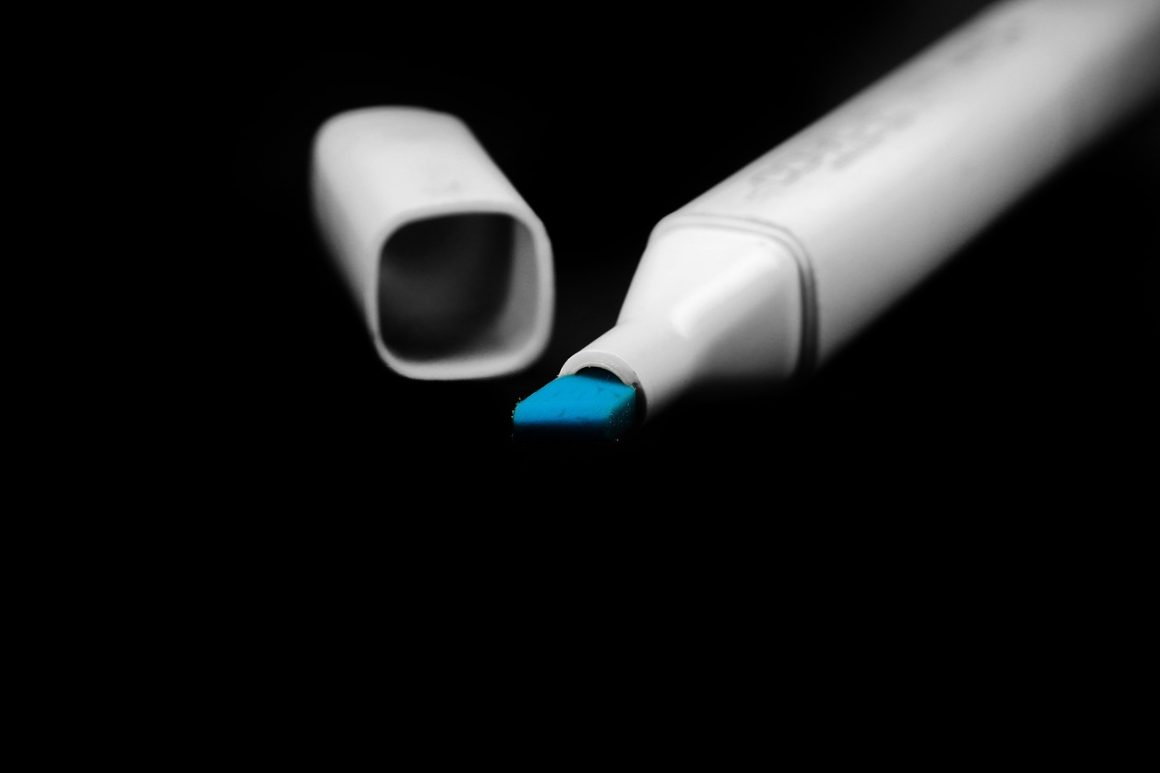If you are a dedicated autograph hunter, then you know how important it is to have the right writing instrument. The last thing you want when you meet a favorite celebrity or athlete is for your pen to fail.
Just as bad is selecting the wrong pen for the item that is being signed. Because we understand how frustrating these problems can be, we embarked on a quest to identify the markers for autographs.
Dozens of markers were tested. Some of them dispensed permanent ink while others dispensed paint. Moreover, we examined which pens performed best on which surfaces.
For instance, a marker that works great on a photograph isn’t necessarily the right marker to use on a jersey.
Read on to discover our selections for the pens for collecting autographs.
Best Markers for Autographs
1. Amazon Basics Fine Point Tip Permanent Markers
This 12-pack of black markers is ideal for autograph hunters. Equipped with permanent ink, any signatures captured with these pens will stand the test of time.
Another characteristic that makes this the marker for autographs is the durable, fine-point tip. It makes clean, bold lines that are easy to read.
Another important factor for autograph markers is how quickly their ink dries.
Fortunately, these markers have quick-drying, waterproof ink that lets you capture signatures in any weather conditions without fail.
It’s also worth noting that this ink works on virtual surfaces including photos, glass, plastic, metal, stone, wood, and more.
All of these factors make these markers not only ideal for autographs but also for general use around the house. The ink is an intense black that shows up on anything with ease.
Most people who have purchased these pens give them high marks for affordability and genuinely waterproof ink. Nonetheless, some users warn about the caps not always easily clicking into place.
If you’re looking for an affordable alternative to brand names, this is a great choice.
Pros
- Durable fine tip
- Makes bold and slender lines
- Works on a variety of surfaces
Cons
- Must use care when replacing caps
2. SHARPIE Metallic Permanent Markers
Manufactured by the trusted Sharpie brand, these are the pens for baseball autographs thanks to the metallic sheen of the ink.
The gold, brown, and silver variety pack is ideal for the white background of a baseball, but it can work just as well on items like photographs, posters, and more.
The fine point of each pen is surprisingly durable, and it is excellent for use on hard surfaces.
With ink that flows easily from the tip, there’s never a need to shake or prime these pens to get them working.
The ink itself is specially formulated by Sharpie so that it is permanent and opaque.
Whether used on light-colored or dark-colored surfaces, this ink will stand out.
These made-in-the-USA pens include a silver marker for autographs. That’s because the ink dries fast and resists both water and fading. Coverage is excellent, even when used over larger surfaces.
Not surprisingly, many people swear by these Sharpie markers for collecting autographs and millions of other uses. However, several people complain that the gold version just doesn’t pop like the others.
Anyone looking for a silver marker for autographs will love this option.
Pros
- Reliable Sharpie quality
- Excellent fade resistance
- Durable tips
Cons
- Gold ink appears dull compared to others
3. SHARPIE Metallic Permanent Markers
This blister pack of two silver metallic Sharpies is an excellent choice for the autograph hunter. The sheen on this ink is amped up for amazing results on both light and dark surfaces. Opaque and permanent, you’ll never have to worry about this ink fading.
These are the pens for autographs because the ink is so pleasingly bold. Plus, the fine points are capable of making both detailed and bold strokes, making them perfect for signatures.
The quick-drying ink is a major plus when you’re collecting autographs. Also, it’s worth noting that the ink flows with ease without any shaking or other preparation.
Saying that these pens leave behind marks that are incredibly easy to read on any surface, many people are devoted to these metallic Sharpies. The only criticism of this product is that they run out of ink fast.
It’s impossible to go wrong with these bold and trustworthy markers.
Pros
- Unbeatable sheen
- So easy to use
- Bold, permanent ink
Cons
- These markers go through ink fast
4. Dyvicl Metallic Marker Pens
This set of 10 diverse colors is your first choice if you’re looking for a marker for autographs on fabric. That is because these metallic markers have undoubtedly bright and shiny ink.
Plus, they are odorless, non-toxic, and acid-free. Accordingly, your autographs and craft projects will stand the test of time. These markers have medium tips, which is another factor that makes them ideal for application on fabric.
They make bold, easy-to-read lines, and the ink freely flows. Plus, it is an advantage to have a choice of 10 colors, which also helps any autographs that you collect stand out in the background.
Praising the highly pigmented ink, many people use these pens when writing on a variety of fabrics. They say that the ink stands out well even on dark fabrics. Nonetheless, critics caution that the ink doesn’t dry particularly quickly.
When you’re collecting autographs on fabric items like t-shirts, these markers are winners.
Pros
- Vibrant colors
- Medium tips that are perfect for fabric
- Excellent ink flow
Cons
- The ink is not quick-drying
5. Gold and Silver Metallic Marker Pens
If you are a sports fan who loves to collect signed helmets, then these markers are especially for you. This pack of four pens includes two gold and two silver metallic markers.
Each 1.5 mm tip is perfect for collecting signatures because it’s just a little thicker than usual. Accordingly, you’ll get bold, memorable autographs every time.
The writing experience with these pens is smooth. Also of note is how fast the ink dries. Smears and smudges definitely won’t be a problem.
This opaque ink provides great coverage and is waterproof. Having a fine brush tip on each pen makes this the marker for autographs on helmets.
Of course, you’re not restricted to using these pens on helmets. They work just as well on fabric, metal, glass, photos, wood, and more.
People love how these pens can leave bold marks. The color saturation is excellent on any color background. Like some other markers, these go through ink fast.
For capturing signatures on helmets, these markers work like a charm.
Pros
- Smooth flowing ink
- Fantastic metallic colors
- Can be used on a wide variety of surfaces
Cons
- You may run out of ink fast
6. PILOT Metallic Permanent Paint Markers
Pilot is another one of those highly recognizable brand names, so it’s hard to go wrong with this choice.
The price isn’t bad for two high-quality pens that are equipped with extra-fine tips. It is that tip that makes this the marker for autographs on jerseys.
The bold silver or gold ink that is dispensed from these pens looks great on dark backgrounds and looks almost as good on white or light-colored backgrounds.
Pilot is a trusted name in writing instruments thanks to their more than 100 years in business. Accordingly, these pens perform as well as you would expect them to.
These permanent markers feature a sparkly finish that can make any autograph stand out whether it’s placed on a photo, helmet, jersey, or another item. The ink is always bright and vivid, and it flows easily from the pen.
People love these pens, especially because each marker has a ball to stir the ink inside the barrel. This means no separation and a uniform saturation of color. Be aware that you may need to shake or pump the pen to get the ink flowing.
When you’re looking to capture an autograph on a jersey, these Pilot markers won’t let you down.
Pros
- Excellent construction
- The fine-tip pen is perfect for certain applications
- Highly saturated ink that stands out on any background
Cons
- Must shake or pump the pen to start the ink flow
7. Krylon K09901A00 Leafing Pen
The price of this single pen is a little bit high, but most people think that it is worth the price. That’s because of the 18 karats gold paint that this marker dispenses.
Originally intended as a means to add gold leaf to a variety of craft projects, people have since discovered that these are the pens for book autographs because the ink looks so amazing on the page.
Another point in this marker’s favor is that it has a chiseled tip.
This means that it is possible to write thick, bold lines and small, delicate lines with equal ease. Accordingly, this marker is ideal for capturing signatures.
With a thick, gorgeous sheen, these markers are popular with autograph hunters because they provide such an easy way to make your favorite signatures even more memorable and valuable.
Be aware that you may experience a bit of dripping from the tip of this pen so use it with care.
If you want to capture an autograph that is memorable on many levels, then use this marker that dispenses 18-karat gold paint.
Pros
- Dispense 18-karat gold paint
- Thick, gorgeous sheen
- Easy flow for writing
Cons
- Drips and blobs may happen
8. Sharpie Fine Point Permanent Marker
This package of one black Sharpie is an economical choice, yet you still get that brand-name quality and reliability.
Users sometimes choose this particular model over the competition because the point is retractable.
That can be useful when you’re in a situation where you’re likely to be jostled by a crowd as you try to collect autographs.
This is the marker for autographs on cards because the ink is compatible with so many surfaces.
Whether the cardstock is glossy or not, these markers will leave a bold signature.
The ink is permanent, so use it with care. In addition to paper, these pens are great for marking metal, plastic, glass, and other materials.
With quick-drying ink that’s resilient and bold, water and fading are unlikely to harm the autographs that you collect.
People love the retractable tips, especially because there’s no cap to lose. Nonetheless, they do caution against keeping these markers in a pocket just in case the clicker gets activated, as this will leave a mess.
These markers put together Sharpie quality and the convenience of a retractable tip.
Pros
- Retractable tips
- Water- and fade-resistant ink
- Easy flowing ink
Cons
- May not want to store these pens in a pocket
9. DecoColor Premium Chisel Paint Marker
If you’re looking for a more economical choice in a gold paint pen, then you’ve got to check out this option.
The gold metallic finish paint beautifully reflects light, which might be ideal if you’re going to be displaying your autographed items for all to see.
The paint dispensed by this marker is saturated with pigment so that it always leaves a bold mark.
It is oil-based, and this means that it should be applied with care.
It’s better not to get this paint on surfaces that you don’t intend to mark because removing those marks will involve chemicals like turpentine or acetone.
Users love the chisel tip because it enables them to make both bold and delicate lines. That’s ideal for getting autographs. Some critics do warn that this pen works best when it’s used slowly.
If you want to make an autograph stand out on a dark background, then this is a fantastic choice.
Pros
- An inexpensive marker with gold paint
- Makes bold marks
- Super-saturated pigment
Cons
- Works best when moved slowly across the surface
10. Sakura Identi-Pen Blister Card Permanent Marker
This multi-surface marker is an excellent choice when you want to make an indelible mark.
With two tips, you get to choose which end of the pen is better for the autograph you want to collect and the material on which it will be captured.
One tip is a fine fiber tip while the other is an extra-fine plastic tip.
The waterproof ink is suitable for use on many surfaces including leather, photographs, plastic, wood, metal, glass, and more.
Another really attractive feature is that this marker has a low odor. That’s critical if you’re sensitive to smells.
People say that these markers are incredibly smooth for writing, and while most enjoy using them, some remark that they have experienced the ink rubbing off of frequently used or touched items.
As long as you use these pens on autographed items that won’t be touched or used regularly, they perform like champs.
Pros
- Makes bold marks
- Has two tips
- Low odor
Cons
- The ink may rub off of frequently used or touched items
Factors to Consider
Whether you’re fascinated by athletes, movie stars, or musicians, an autograph is a priceless keepsake that you’ll treasure forever. Of course, if you want that signature to stand the test of time, then it’s wise to use the right pen for the job.
In most cases, some type of marker is considered appropriate for getting signatures. These writing instruments tend to have easy-flowing ink and be reliable. They also create a bolder statement than a mere ballpoint pen, so that you’ll be able to see that signature from across the room.
Ink or paint
One of the first considerations you’ll have to weigh with an autograph marker is whether it dispenses ink or paint.
Ink is preferred by most people as it dries quickly and is less prone to clumping and blobs. Still, others swear by paint pens because of the incredibly bold marks that they make.
If you go this route, be prepared to allow plenty of drying time for your autographs.
Surface
You’ll also want to give some thought to the surface or material to which the autograph will be applied.
While some markers are suitable for almost any surface from fabric to metal, others are admirably suited to just one or two materials.
Before choosing a marker for a particular autograph, take a look at the item you’re having signed.
You may want a different marker depending on whether you have a t-shirt or a helmet signed.
Сolor
Another critical factor to think about is the color of the ink or paint. In general, it’s not wise to use colors other than black, blue, or silver for autographed items.
These colors tend to show up best on a wide variety of backgrounds, and they also tend to be more fade-resistant.
FAQs
What color ink is for autographs?
In general, it’s wise to stick with blue, black, or silver when collecting autographs because these colors tend to show up best against a variety of backgrounds. Moreover, they tend to resist fading better than other colors.
Should I use an ink marker or a paint marker when collecting autographs?
Ink markers typically provide the best in reliability and function. You can nearly always trust them to start flowing as soon as the pen’s tip touches the surface.
Paint pens can still be great, but they occasionally are subject to clumping or flow problems, which means you have to know your markers so that you’re ready to collect an autograph. It may be necessary to prime your paint marker before you hand it to the celebrity who’ll be signing the autograph to avoid any awkwardness.
Can autographs fade?
If you use the right marker, then you’ll have little reason to fear fading. That’s because the ink and paint that are used in autograph markers are formulated to resist fading. To further protect your keepsake, be sure to protect your memorabilia from direct sunlight and display it in a protective case or covering.
Making the Decision
When it comes to the best in functionality and reliability, you can’t go wrong with the Sharpie Fine Point Metallic Silver Permanent Marker. The ink dispensed by this pen is simply outstanding, and you can always trust this marker to get the ink flowing without hassle. The quick-drying ink also is a huge plus for autograph hounds.
Of course, we would be remiss if we didn’t mention our pick for the markers for autographs if you prefer to paint. Specifically, we recommend the Krylon Leafing Pen. Nothing beats the sheen of this paint, and this pen benefits from better, more reliable flow when compared with other paint pens.


